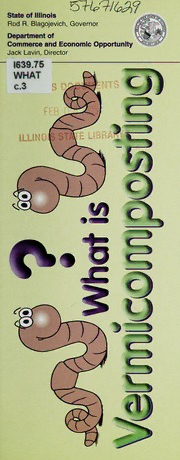Table Of Content6IrlSHbtff
State of Illinois
Rod R. Blagojevich, Governor
Department of
Commerce and Economic Opportunity
Jack Lavin, Director
What is vermicomposting?
Vermi is the Latin word for worm and
composting is the process of turning
organic waste into nutrient rich soil.
Therefore, vermicomposting is the
process of converting organic waste into
nutritive humus using worms. The worms
are kept in an enclosed container (called a
worm bin, see picture at right) where they
are fed kitchen scraps and table food
waste.
The worms used for vermicomposting are
commonly called red wigglers, redworms
or manure worms, but the exact species is
Eisenia foetida. One pound of red wig¬
glers will consume a half pound of food
per day. These worms are known as sur¬
face feeders and live in depths from six to
18 inches, which is why they survive and
even thrive in a confined space such as a
worm bin. What are commonly thought of
as earthworms (Lumbricus terrestris) are
not suitable for vermicomposting because
they burrow several feet into the earth, do
not like having their habitats disturbed,
and live best at lower temperatures.
The product left after the worms digest and
eliminate food is called “castings.” Worm
castings have been called “Black Gold”
because they are the most nutrient-rich soil
Printed by the Authority of the State of Illinois • W. O. 05-0449 • 5M 02/05
Vermicompc sting Worm Bin
Food
Bedding
Waste
Worms Castings
amendment on the planet. Castings help castings. “Planting” worms in depleted soil
eliminate certain plant diseases, keep soil for refertilization is a new technology use¬
aerated, retain moisture in the soil, and act ful to gardeners and farmers.
as an excellent organic pesticide.
Organic waste (not including paper)
Red wigglers need air, moisture, food, makes up 11% to 13% of all material
bedding, and constant 55-85 degrees found in landfills and is one of the biggest
Fahrenheit to live and work productively. problems facing the solid waste industry
Shredded newspaper, peat, or coir (shred¬ today. This organic waste can be efficiently
ded coconut shell fiber) can be used for and economically vermicomposted by
bedding. These little wigglers are easy to restaurants, cafeterias, and industries that
care for; they are quiet, eat food waste, produce large
and do not require visits to a veterinarian. volumes
A bin can easily fit into a classroom, office, of food
or even under the kitchen sink.
Vermicomposting is an economically
viable system with commercial
uses as well, from organic waste
reduction to marketing worm
waste. The castings, a value-added product,
can then be used in gardening, landscap¬
ing, viniculture, golf course maintenance,
and organic farming, to name a few.
Care for a cup of Worm Tea?
If you are a gardener you will respond
with a hearty, “Yes! And make it a big
one!” Worm tea is extra liquid that drains
from a vermicompost bin and is an excel¬
lent fertilizer as well as an organic
pesticide. You can
make additional ^
worm tea by
mixing one
cup of
castings
in one
gallon of
water.
The tea
can be
sprayed on
indoor and out¬
door plants, trees,
shrubs, and gar¬
dens, and serves
as an organic
insecticide.
Did You Know? Resources:
1. Worms have five pairs of hearts, hemo¬ Two excellent books about raising worms are:
globin, and a circulatory system much Worms Eat My Garbage
like ours. by Mary Appelhof.
.
2 Worms breathe through their skin by www.wormwoman.com
absorbing oxygen through the wet sur¬
Recycle With Earthworms: The Red
faces of their bodies.
Wiggler Connection
.
3 Worms will eat coffee grounds and the
by Shelly Grossman and Toby Weitzel.
filters!
ISBN 0-914116-32-0
.
4 Worms have no teeth, but a gizzard for
grinding their food. Illinois Department of Commerce and
.
5 One pound of red wigglers will eat one Economic Opportunity, Illinois sustainable
half pound of food per day. Education Project (ISTEP) - www.istep.org
Need Worms or castings?
California Integrated Waste Management
Contact these Illinois worm growers.
Board - www.ciwmb.ca.gov/vermi/
Northern Illinois: Castings and
Urbana Extension, University of Illinois at
worms: Dean Allen at:
Urbana-Champaign -
[email protected]
www. urbanext. uiuc. edu/worms
Central Illinois: For a worm bin or
There are so many worm web sites it’s
worms by the pound call Doug Lake
impossible to list them all. Just go to a
at 217/942-9233
search engine and type in vermicompost-
South Central: Castings and worms: ing. The available information is amazing!
New Horizon Organics, Inc.
618/498-6459,
e-mail: [email protected]
Anatomy of a Worm
Clitellum Segments
Anus
Mouth
Want more information about
vermicomposting?
Contact Brett Ivers at the Illinois
Department of Commerce and
Economic Opportunity, Bureau of
Energy and Recycling, 620 E. Adams,
Springfield, IL 62701.
Call 217/524-5859 or e-mail at:
[email protected] te.il. us
Ask about the Eeek!
There's A Worm In My
Room, educational case.
This case contains videos,
books, and lesson plans for educators
who are interested in starting a vermi¬
composting bin. The case may be kept
for two weeks and is free!
dceo
Illinois Department of
Commerce & Economic Opportunity
Bureau of Energy & Recycling
Rod R. Blagojevich, Governor
Jack Lavin, Director

